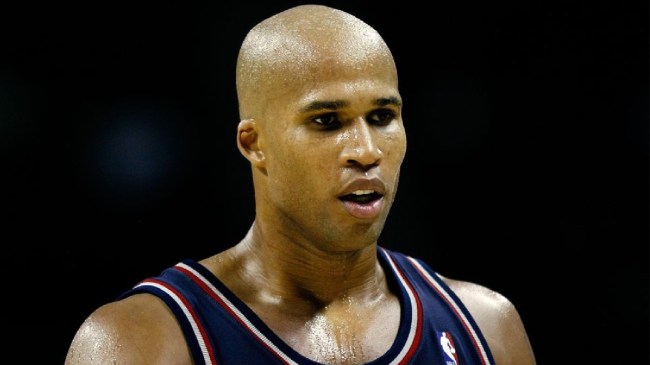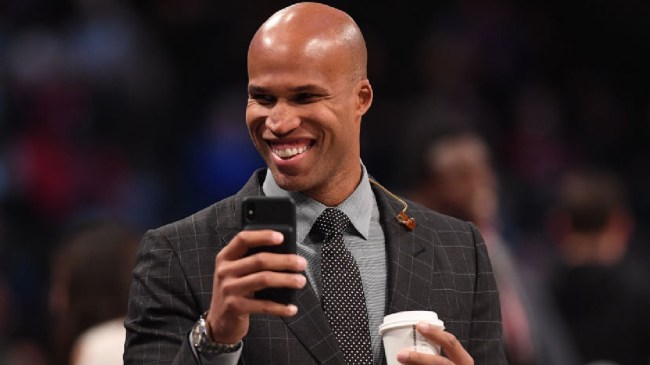
Getty Image
Richard Jefferson is known for a few things: being a very solid basketball player who spent 17 seasons in the NBA, having a very bad tattoo on his left arm, and (for those in the know) calling off a wedding in maybe the worst way possible.
Professional athletes are obviously busy people who devote much of their time and energy to the sport they play and have a schedule filled to the brim with workouts, practices, and games that can make it difficult to strike an adequate balance with their personal lives.
That’s just one of a few reasons it can also be harder for people in that line of work to find love compared to the Average Joe working a 9-5 job.
If you keep tabs on the tabloids, you know plenty of famous athletes are serial daters who seem like they’re constantly jumping from one relationship to the next or balancing different partners in different cities. That’s obviously not the case with everyone, but if I noticed anything in the decades I’ve spent following sports, it’s that athletes can have a bit of trouble holding down a romantic relationship.
That can lead to some awkward situations—like the one Jefferson found himself facing when he decided it was time to move on from a woman he’d promised to marry.
Richard Jefferson called off his wedding via an email to his fiancée

Getty Image
It’s Independence Day weekend in 2009. Richard Jefferson had just gotten traded to the Spurs less than a year after the Nets had dealt him to the Bucks to bring his eight-year run in New Jersey to an end, and he’s got a lot on his plate.
At that point, the guard had been dating Kesha Ni’Cole Nichols for five years, and the two of them were set to tie the knot in a wedding ceremony that had been scheduled for July 11th.
However, he couldn’t shake the feeling he got when he and his fiancée attended a Fourth of July party a week before they were supposed to get married, which led him to do some serious soul-searching.
He eventually realized he couldn’t go forward with the planned nuptials and that he had to let Nichols know that was the case—and he did so by shooting her an email a few days before they were going to get married.
Yes, you read that right: Richard Jefferson sent his girlfriend/fiancée of five years an email to call off their wedding around a week before it was supposed to happen.
It didn’t take long for the press to catch wind of that development, which led to Jefferson doing what he could to clear the air in an interview with The New York Post where he stated “There was a lot of stress and tension in the relationship. We’ve been through a lot—but we just couldn’t continue” while adding “I won’t say a negative word about Kesha. She is one of my best friends.”
Jefferson acknowledged he wrote her an email (as opposed to going a different route) so he could get all of his thoughts down in one place and communicate them accurately (he also gave her a “lump sum” of money to help her move on).
I guess I can sort of see why he thought it was the right play, but that’s an objectively wild move on Jefferson’s part.
It’s one thing to write everything down so you can convey all of the points you feel you need to make while explaining a pretty monumental life decision, but throwing them into an email and hitting “Send” is a very bold strategy.
I have so many questions: Did she respond directly to the email? What was the subject line? How did he sign off? Was there a promise to circle back at EOD?
Again, pro athletes are busy people, but there’s really no excuse here. If you dated her for five years and supposedly still respect her despite getting cold feet a week before the wedding, you could have at least given her a call, Rich!
You obviously have to feel for Kesha, who thought she was about to marry the man she loved—never mind a multimillionaire playing in the NBA—only to get an email with some variation of “Wedding’s Off” in the subject line (it’s worth noting she eventually clarified she didn’t hold it against Jefferson).
I’m sure the undisclosed lump sum probably made it a little easier for Nichols to move on with her life, but even if you can afford to offer the same gesture, you should probably think twice about doing the same thing Jefferson did if you ever end up in a similar position.